Sweet, refreshing, and hailed as nature’s sports drink, coconut water has taken the wellness world by storm. But if you have diabetes, you might wonder: Is this tropical treat a friend or foe to your blood sugar? Let us crack open the truth behind the coconut and see if it deserves a spot in a diabetic-friendly diet.
Nutritional profile of coconut water

A glass of approximately 240 ml of coconut water contains the following nutritional value:
| Coconut Water Calories | 60 |
| Carbs | 15 grams |
| Fats | 0 grams |
| Sugar | 8 grams |
| Calcium | 4% of the Daily Value (DV) |
| Magnesium | 4% of the DV |
| Phosphorus | 2% of the DV |
| Potassium | 15% of the DV |
Key nutrients beneficial for diabetics
With a significant magnesium content, coconut water aids in managing blood sugar levels through insulin metabolism. Magnesium is key in regulating your body’s insulin sensitivity, enhancing its ability to secrete insulin. Additionally, the high potassium content offsets the low levels typically seen in individuals with type 2 diabetes.
Health benefits of coconut water
Coconut water offers various potential health benefits. For individuals with diabetes, it may provide a natural way to support hydration, maintain blood sugar balance, and enhance overall wellness.
Hydration and electrolyte balance
Staying hydrated is essential for diabetics to keep blood sugar levels in check. Coconut water, rich in electrolytes, can help balance mineral levels and serve as an excellent hydrating option.
Potential blood sugar regulation
Coconut, including its water, flesh, and oil, contains essential nutrients such as dietary fiber, healthy fats, and minerals. These components work together to slow the absorption of sugars into the bloodstream, preventing rapid spikes in blood sugar levels after meals.
Antioxidant properties and immune support
Coconut is rich in antioxidants, including polyphenols and flavonoids, which can neutralize harmful free radicals in the body. These antioxidants reduce oxidative stress and inflammation associated with diabetes complications. Furthermore, these antioxidants and essential nutrients support the immune system, offering added protection for diabetics with compromised immunity.
Risks and considerations
Coconut water provides several health benefits. However, diabetics should be aware of particular risks and considerations before incorporating it regularly into their diet.
Potential blood sugar spikes
Coconut water is lower in sugar than many sugary drinks. However, it still contains natural sugars that can raise blood glucose levels. For diabetics, especially those with tightly controlled blood sugar, consuming too much coconut water can lead to unexpected spikes. Therefore, it is crucial to monitor portion sizes and assess individual blood sugar responses.
Kidney health and potassium levels
While coconut water’s high potassium content helps diabetics produce more insulin, excessive potassium can cause kidney damage. Although our body can eliminate excess potassium through urine, this process doesn’t occur if our kidneys aren’t functioning properly. Therefore, people with diabetes should maintain healthy kidney function and consult their physician before regularly consuming coconut water.
Importance of moderation and monitoring
Moderation is key for managing coconut water and diabetes. While it can be a healthy addition to the diet, consuming it in controlled amounts and monitoring blood sugar levels afterwards ensures it does not disrupt glucose control.
Best practises for consumption
To safely enjoy coconut water, individuals with diabetes should follow a few best practises that promote stable blood sugar levels and overall health.
Choosing unsweetened, natural varieties
Pay attention to labels and choose unsweetened versions. Always opt for fresh coconut water when possible.
Ideal timing and portion control
If you have diabetes, you should ideally consume unsweetened coconut water early in the morning on an empty stomach. This is the best time to boost your immune system with the lauric acid present in coconut water. It possesses antifungal, antibacterial, and antiviral properties that strengthen your immunity while energizing you for the entire day. Furthermore, coconut, especially coconut oil and coconut-based products, is calorie-dense and can add up quickly. Be mindful of portions to avoid excessive calorie intake.
Avoiding coconut meat (malai) and packaged options
People with diabetes should avoid drinking water from mature or brown-colored coconuts layered with malai or coconut meat. Additionally, it is essential to avoid packaged coconut water products, as they may undermine health benefits.
Comparison with other beverages
When choosing beverages, diabetics must consider both sugar content and nutritional value. Therefore, comparing coconut water with other common drink options is beneficial.
Coconut water vs. fruit juices
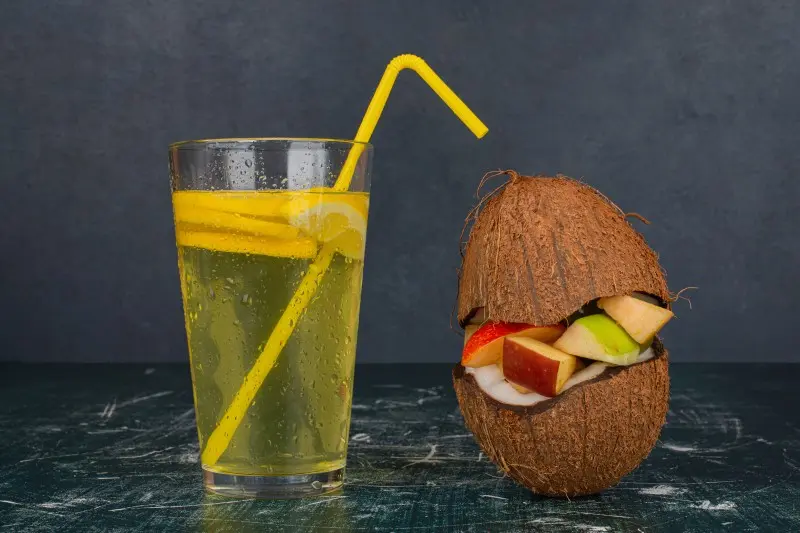
Coconut water typically contains less sugar and fewer calories than most fruit juices. This makes it a better option for diabetics looking to manage their blood sugar. Additionally, fruit juices often have added sugars. On the other hand, coconut water provides a natural, hydrating alternative with essential electrolytes and a mild flavor.
Coconut water vs. sports drinks
Coconut water is a healthier choice than many sports drinks. It has less added sugar and no artificial ingredients. Packed with natural electrolytes like potassium, it hydrates effectively without spiking blood sugar. Unlike sports drinks, it is a more natural way to stay refreshed.
Coconut water vs. plain water
For diabetics, plain water is the safest choice for hydration. It has no sugar or calories. Coconut water offers electrolytes and nutrients but contains sugars. These sugars can affect blood glucose levels. Drink coconut water in moderation, especially after exercise. For daily hydration, stick to plain water.
Expert opinions and research findings
Expert opinions and research findings provide valuable insights into how coconut water affects diabetics. These insights help guide informed decisions about its consumption.
Insights from nutritionists and healthcare providers
Insights from nutritionists and healthcare providers in India suggest that coconut water can be a beneficial addition to the diet of individuals with diabetes, provided it is consumed in moderation. Experts highlight its low glycemic index, which means it causes a slower rise in blood sugar levels compared to many sugary beverages. Additionally, coconut water is rich in electrolytes like potassium and magnesium, which can aid in hydration and support overall health.
However, healthcare professionals also caution that coconut water contains natural sugars, and excessive consumption may result in blood sugar spikes. Therefore, monitoring portion sizes and consulting with a healthcare provider or nutritionist is recommended to determine the appropriate amount based on individual health needs.
Recommendations for diabetic patients
Here are some key recommendations for diabetic patients when consuming coconut water:
- Limit intake to small amounts (e.g., 1/2 to 1 cup) to prevent excessive sugar consumption that could impact blood glucose levels.
- Check blood glucose levels regularly to see how coconut water affects your body, especially after consumption.
- Coconut water can be a good post-exercise drink to help replenish electrolytes lost during physical activity, but always monitor your body’s response.
- Plain water should remain your primary source of hydration throughout the day, with coconut water as an occasional option.
Coconut water can be a sweet sip of nature — just consume it smartly. With moderation and mindful choices, diabetics can enjoy the splash without the spike!
Key Takeaways
- Coconut water promotes hydration, regulates blood sugar levels, and boosts overall wellness.
- Monitor your blood sugar levels to understand how your body responds when you consume coconut water.
- Always go for unsweetened, natural coconut water to avoid added sugars.
Stay tuned to the Activ Living Community. Keep up to date with the latest health tips and trends through expert videos, podcasts, articles, and much more on nutrition, fitness, mindfulness, and lifestyle conditions like Asthma, Blood Pressure, Cholesterol, and Diabetes. Activ Living ke saath sahi sehat ki shuruat ABHI karo.
You may also be interested in the following blogs:
- Coconut Health Benefits: A Tropical Treat That’s Good for You
- How Does Coconut Water Help Lower High Blood Pressure? Know The Science
Popular Searches
How to lower blood pressure | Fruits good for liver | Unhealthy foods | Ragi Benefits | Basal Metabolic Rate | Acupressure points for High Blood Pressure | Ayurvedic medicine for blood pressure | How to control cholesterol at home | Homeopathy for Asthma | Biological Age | Home remedies for TB | Natural beta blockers | Negative effects of internet | Types of walking | Blood pressure calculator | Blood sugar calculator | BMI Calculator





 1800-270-7000
1800-270-7000



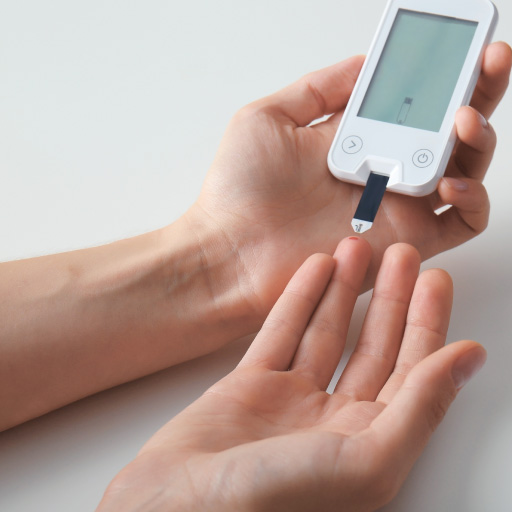
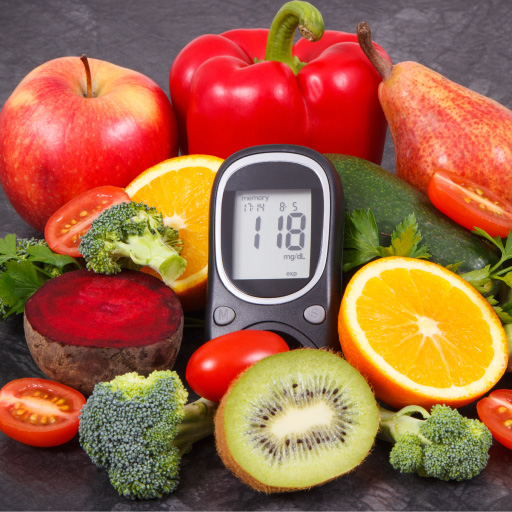

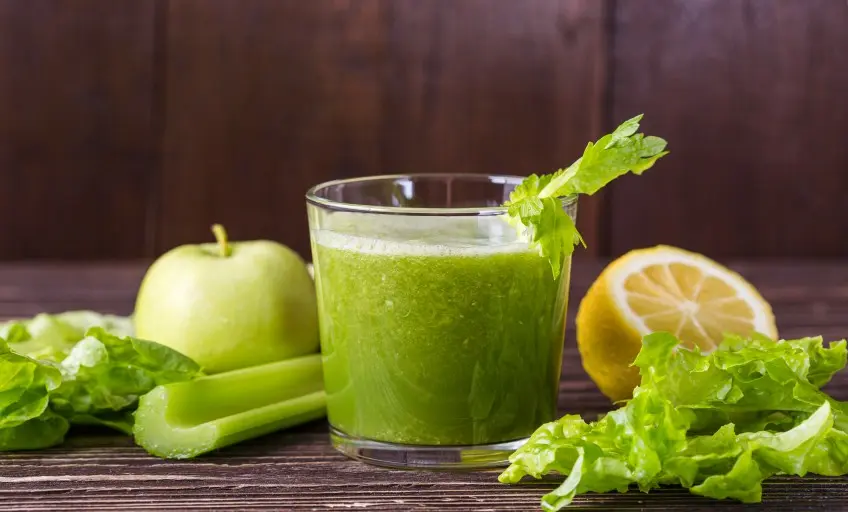
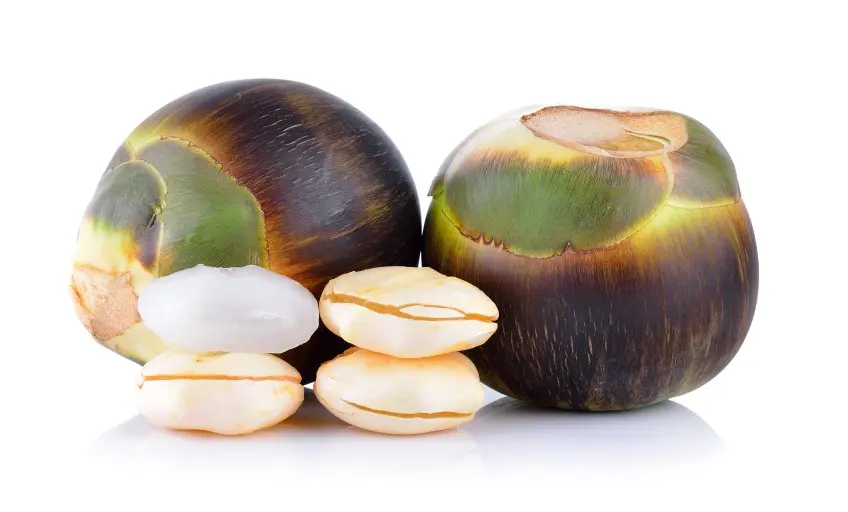



Great natural resouraces in coconut water to maintain sugar leval and so many other vitimin in their
Use of coconut water is necessary for Health.